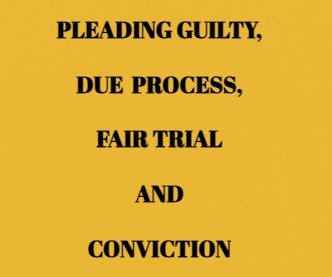

By Sunil Garodia
First publised on 2021-06-09 08:23:50
If the trial court asks an accused how he pleads and if the accused replies in a monosyllabic 'yes', is it enough for the court to convict him of the crime? A single judge bench of the Kerala High Court (presided by Justice V G Arun) doesn't think so. The bench issued a seven-point guideline which courts must follow before convicting an accused on pleading guilty.
The court was hearing a revision petition by an accused person who was convicted u/s 35 of Kerala Prevention of Disturbances of Public Meetings Act for obstructing the procession for a school admission festival and assaulting certain volunteers involved. The accused had pleaded not guilty initially but revised it to guilty after several adjournments. He filed the revision petition challenging his conviction on the grounds that the magistrate did not follow procedure and denied a fair trial.
The court said that the procedure prescribed in sections 240 and 241 of the CrPC are elaborate and designed to get a clear and unambiguous admission of guilt from the accused. If courts do not follow the procedure and convict the accused merely on admission of guilt, it would amount to denial of a fair trial. The court observed that in the instant case the plea was recorded casually. It then proceeded to frame a seven-point guideline to be followed by courts in such cases.
The guideline prescribes that:
* Magistrates must frame the charge clearly specifying the offences alleged against the accused
* Such charge should be read over and explained to the accused
* The accused should be asked how he pleads of the offences charged against him
* The accused should plead guilty after understanding the seriousness of the allegations and the implications of pleading guilty. The plea should be voluntary and expressed in clear and unambiguous terms.
* Magistrates must record the plea of guilty in the words of the accused, to the extent possible.
* Magistrates should exercise their discretion and decide whether to accept the plea after considering all relevant factors.
* If the plea is accepted, the accused can be convicted and suitable punishment may be imposed.
In issuing the guideline and setting aside the trial court order in the instant case, the bench looked into the legal meaning of the words 'plea' and 'guilty'. While 'plead' was considered to mean 'to make, deliver, or file any pleading', the term 'guilty' was defined as having committed a crime or tort. The court then surmised that 'pleading guilty' required the accused to unambiguously admit to having carried out all elements of the offence after clearly understanding the implications of such admission. Hence, it said that a mere 'yes' would not suffice as any conviction based on the accused pleading guilty in an ambiguous manner results in penalty without trial.











